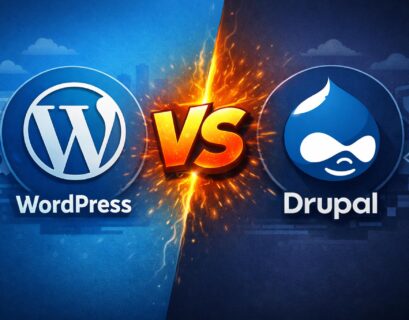Choosing the right e-commerce platform is one of the most important decisions any online retailer will make. With the continued rise of digital shopping, businesses need a solution that offers flexibility, reliability, and room to grow. Magento is often mentioned among the leading options – but what makes it so widely used, and is it truly the best fit for your needs?
In this article, we’ll take a closer look at Magento’s features, benefits, and drawbacks. From its open-source foundations to its enterprise-level capabilities, we’ll help you understand where Magento stands in today’s competitive e-commerce landscape – and whether it’s the right choice for your online store.
Table of Contents
Magento, what is it?
Magento is an open-source CMS owned by Adobe. The platform is free* and that is why it is the popular choice of many small companies. It is also easily expandable through extensions from the Magento Marketplace. This makes it very customizable. Another benefit is the huge developers’ community behind it. The people have created a rich ecosystem around it, and they are adding new elements quite often.
Thanks to the massive interest in the platform, there are many experts in Magento and finding Magento support employees, Magento SEO experts or hiring offshore Magento developers is not hard. There is also a certification program from the brand.
Big companies also love it. Many well-known brands like Coca-Cola, Nike, and Ford, use it.
According to Alexa, from the most visited 1 million sites in the world, 19.64% use Magento (January 2018). It is the number one e-commerce platform, just in front of WooCommerce.
The Enterprise version of Magento cost 18 000 USD (Magento 2 starts at 22 000 USD). It is not free like the one for small and medium-size businesses, but it is still affordable for big brands.
Ready for ultra-fast DNS service? Click to register and see the difference!Experience Industry-Leading DNS Speed with ClouDNS!
What is Magento 2 and how is it different?
Magento 2 is the latest major version of the Magento platform, released to address performance limitations and usability issues found in its predecessor. It introduces a more modern technology stack, including support for PHP 8, improved database handling, and full-page caching for faster load times key advantages for running a dropshipping website efficiently. Magento 2 also brings a redesigned admin panel that’s more intuitive and mobile-friendly, making store management easier even for non-technical users.
In addition to speed and design improvements, Magento 2 offers better scalability and a modular codebase that facilitates custom development. Extensions built for Magento 2 are more stable and secure, and the platform provides enhanced checkout processes and built-in testing capabilities. For businesses starting fresh or planning a long-term investment, Magento 2 is the recommended path.
Benefits of Magento
Free*
We already mention it, that there are two versions, the Community one, and the Enterprise. The first is free, and you can see the whole source code and how to install it here in GitHub. Even though it’s free, the Community version includes essential features and functionality that can support full-scale e-commerce operations. It’s also a great starting point for businesses exploring open-source platforms.
Easy to install
You can get it from GitHub, Magento’s website or even from your web hosting provider for free. You need to follow a step-by-step process that will take you less than half an hour. If you experience any difficulties, there are plenty of YouTube tutorials on how to set it up. Additionally, web hosting providers often offer Magento pre-installed packages to speed up the setup process. This makes Magento accessible even to users with minimal technical skills.
Magento is full of features
It has a massive amount of pre-installed features like personalized products, purchase order management, promotion management, newsletter and more. Companies can start using it immediately, even without installing additional extensions. These built-in tools reduce reliance on third-party plugins, helping merchants maintain performance and stability. Magento is especially suitable for complex catalogs and customer segmentation.
SEO-friendly
E-commerce sites need all the help they can get with their SEO. They contain plenty of products and many unique pages. SEO for Magento is well-built out of the box with proper URLs, good control over the meta tags, XML sitemap and responsive design (it adapts to different screens and devices). Many extensions can help you too. In addition, Magento supports canonical tags, URL rewrites, and automatically generates search engine-friendly navigation structures. These features make it easier for your online store to rank higher on search engines.
Suggested article: CDN and SEO, are they connected?
Multi-sites, a single control
Magento gives you the opportunity to install multiple sites from the same installation. Later you can set different currencies and languages for each from the same back-end administration panel. It is very convenient and saves time. If you are planning to use the multi-sites option, we recommend you to apply GeoDNS. It will increase the speed of your site, improve the SEO and it can potentially increase your sales. This flexibility is ideal for brands that operate in different regions, as it allows them to customize product offerings, marketing strategies, and payment options per market. Managing all of this from a single admin dashboard greatly reduces complexity and cost.
Easy integration
The platform is already in a grown stage, there are plenty of developers behind it, and it is visible. It is very easy to integrate it with third-party services like – payment gateways, inventory software, shipment tracking systems and analytic software. Magento also offers robust APIs that allow deeper integrations with CRMs, ERPs, and customer support systems. This makes Magento a great fit for businesses looking to automate workflows and connect multiple business tools seamlessly.
Magento VS Shopify – a detailed comparison
Cons of Magento
The platform is great, but it doesn’t mean it is flawless. There are few of the disadvantages that it has that are worth mentioning:
Heavy for cheap web hosting
If you want to use it with many products, it is better to rent private servers instead of a shared web hosting. You will need all the resources of the servers because there will be many operations to be made. Magento’s architecture is resource-intensive by design, aiming to offer flexibility and scalability at the cost of higher hosting requirements. A good hosting setup can drastically improve your Magento site’s performance and loading speeds.
Time-consuming
The high customization has its price, and it is time. Yes, it gives you more options than other competitors, but it could take extra time to complete a specific task. For example, setting up highly customized product pages or advanced marketing campaigns can require significant development hours. Businesses should plan for ongoing technical maintenance if they want to fully leverage Magento’s power.
Enterprise version is expensive
If you want to benefit from the features of the Enterprise version, it will cost you an arm and a leg. Due to the price, just big companies with many sells or very expensive products can afford it. However, for large enterprises, the investment often pays off with superior scalability, advanced analytics, and enhanced customer experience options available only in the paid version.
What you need before installing Magento
Before installing Magento, it’s essential to prepare the foundation that will support your online store’s performance, visibility, and long-term growth. This includes both technical components and strategic choices that influence the user experience and your brand’s identity.
One of the first steps is securing a domain name. Your domain serves as your storefront’s address and is often the first impression customers have of your business. Choosing a short, memorable, and relevant domain can enhance brand recognition and build trust with users. If you need help with this step, you can read our guide on domain name registration to explore best practices and tips.
Next, ensure you have reliable web hosting that meets Magento’s resource needs. Since Magento is a powerful and flexible platform, it performs best on dedicated or cloud hosting environments that can handle its requirements. It’s also helpful to have an SSL certificate in place from the start to secure customer data and build credibility.
Taking care of these essentials upfront sets the stage for a smoother installation process and better performance from day one.
Conclusion
Magento is a great way to begin with e-commerce. It covers all the necessary check boxes and even exceeds the expectations. It is the number one e-commerce platform right now, and it is totally worth it. Its strong ecosystem, flexibility, and feature set make it suitable not just for startups, but for growing and enterprise-level businesses too. With the right hosting and technical support, Magento can deliver a powerful, scalable, and SEO-friendly platform that grows with your business.






